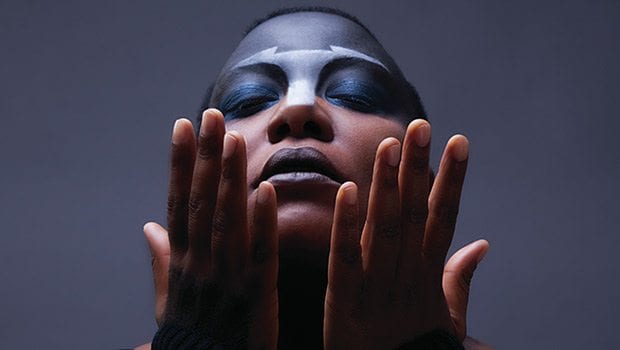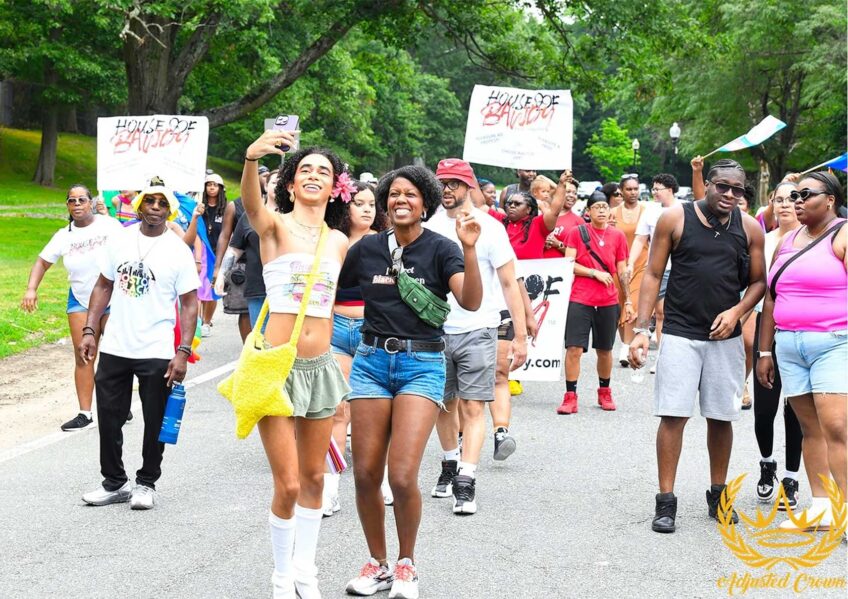
Crossing musical categories to be true to one’s own inclinations can be a risky approach for a singer. But doing just that, vocalist, bassist and composer Meshell Ndegeocello has garnered critical acclaim, nine Grammy nominations, and perhaps most telling, the admiration of fellow musicians.
Among them is jazz pianist Jason Moran, who in April performed with her at Berklee Performance Center in their collaborative project, “Fats Waller Dance Party,” a hip hop infused reinvention of Waller’s pioneering jazz compositions.
Ndegeocello, 45, whose name means “free like a bird” in Swahili, has been recording since 1993, and she just released her 11th album, “Comet, Come to Me.” On tour to introduce the new recording, she performed Friday night at The Sinclair in Harvard Square.
During the first of two hour-long sets, she and her band played nine songs from earlier recordings. The second set was devoted to tracks from the new album.
Ndegeocello had a relaxed give-and-take with the audience, whose callouts showed a knowing exposure to her recordings and writings. Her quicksilver responses included a reference to an archive of John Coltrane’s journals.
Articulate with the written word as well, Ndegeocello, who is bisexual, has contributed an acclaimed essay to the best-selling anthology, “It Gets Better: Coming Out, Overcoming Bullying, and Creating a Life Worth Living.”
Adventurous and open to diverse alliances, she has collaborated with artists as varied as Herbie Hancock and Madonna. Her influences include funk, soul, hip hop, reggae, R&B, rock, and jazz.
Decidedly non-diva in her look and manner at The Sinclair, she wore a shirt over slim pants and sneakers. But the photo of Ndegeocello on the new album shows her face as a regal mask. The image evokes a priestess—the persona often projected by her muse, Nina Simone. Ndegeocello dedicated her 2012 album, “Pour Une Âme Souveraine (For a Sovereign Soul)” to Simone.
In her unfettered, searching approach, Ndegeocello also seems kin to such introspective and lyrical singers and songwriters as Cassandra Wilson and Joni Mitchell.
Drawing from all her sources and inspirations, Ndegeocello crafts art songs with a groove. She chants as well as sings, a legacy of hip-hop, and whether they are slow ballads or high-energy songs, her music induces movement.
Her head is close-shaven, and she has an androgynous presence that extends to her voice, which deepens when she speaks but rises as she sings.
As both a vocalist and a bassist, Ndegeocello performed at The Sinclair with her long-time guitarist Chris Bruce, keyboardist Jebin Bruni, percussionist Abraham Rounds, and bassist Paul Bryan. They provided infectious rhythmic backbone as well as textured accompaniment that varied from intricate filigrees to oceanic swells of harmony.
Her distillation of an era—“I’m Diggin’ You (Like an Old Soul Record)”—invites the listener to “Remember back in the day/When everyone was black and conscious/And down for the struggle.” Sweetening the song’s satire is its funky musical journey, which works in rippling bass notes evoking Bo Diddley and a searing Hendrix-style guitar line that contrasts with the easy-going refrain, “Just sit back and relax. Listen to the 8-track.”
The first set included Ndegeocello’s intense, soaring duet with Bruce to “Wasted Time” and a sensational drum solo by Rounds to “Sloganeer” as Ndegeocello, squatting on her knees, pulled fierce lines from her bass guitar.
A slow ballad that Ndegeocello spoke and sang, “Ecclesiastes: Free My Heart,” held the audience in thrall. Confessional in tone, the lyrics tell of an effort to “try to know myself, try to forgive myself.” It came across as a signature song.
Soulful, sensuous, and unforced, Ndegeocello’s music comes from within.






